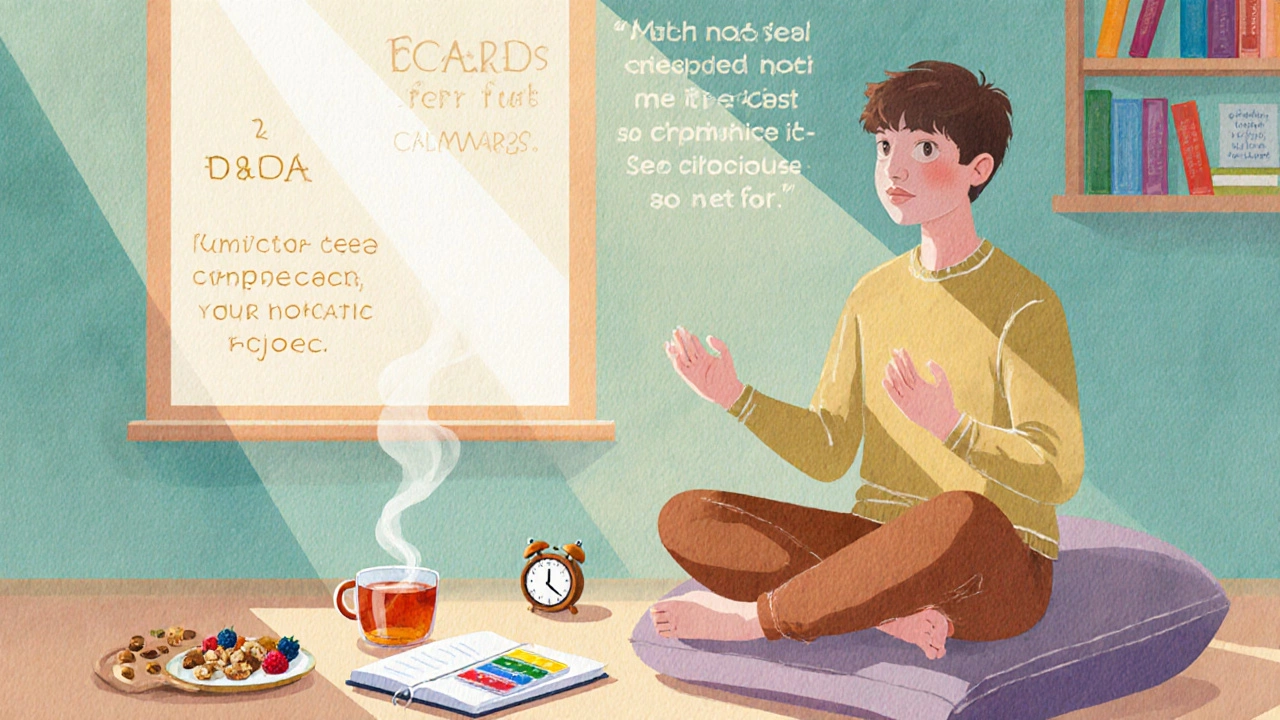World’s Most Stressful Exams Ranked - Which Test Breaks the Stress Meter?
 Oct, 10 2025
Oct, 10 2025
World's Most Stressful Exams - Stress Meter
Stress Level Indicator
Select an exam below to see its stress level visualization.
Exam Details
Select an exam to view details
Select an Exam to Compare Stress Levels
Gaokao
China
High StakesIIT JEE
India
Extreme CompetitionNEET
India
Medical CareerUS Bar
USA
Legal LicenseCPA Exam
USA
Accounting CertificationUSMLE Step 1
USA
Medical ResidencyA-Levels
UK / Global
University AdmissionAustralian HSC
Australia
Statewide AssessmentUnderstanding Exam Stress
Stress levels are calculated based on factors such as:
- High stakes and consequences
- Duration and complexity
- Preparation time required
- Cultural and societal pressure
Ever wondered which single test can make your heart race, hands shake, and nights sleepless? The answer isn’t a simple one‑liner - it’s a blend of cultural pressure, huge stakes, and grueling preparation. Below we break down the exams that consistently top the stress charts, why they feel like emotional roller coasters, and what you can do to survive them.
What Makes an Exam "Stressful"?
Stress isn’t just about a tough question; it’s a mix of several factors:
- High stakes - failure can block a career, a scholarship, or even a legal license.
- Length and format - multi‑day tests with thousands of items leave little room for error.
- Societal expectations - families, peers, and media often amplify the pressure.
- Preparation load - many candidates study 8‑12hours a day for months or years.
- Physical environment - strict timing, proctoring, and sometimes language barriers add to the anxiety.
When these elements converge, an exam instantly jumps into the "most stressful" category.
Top Contenders Around the Globe
Below are the exams that repeatedly surface in surveys, academic research, and personal testimonies as the world’s most anxiety‑inducing.
Gaokao is China’s national college entrance exam, a single‑day, roughly nine‑hour marathon that determines university placement for over 10 million students each year. Its outcomes shape not just individual futures but also family status and regional economies.
IIT JEE India’s Joint Entrance Examination for admission to the Indian Institutes of Technology, known for its ultra‑competitive mathematics and physics sections. The exam filters out roughly 1% of applicants.
NEET India’s National Eligibility cum Entrance Test for medical college seats, a single‑paper test that decides who gets to study as a doctor. A passing score opens a coveted career path; a fail often means years of extra preparation.
US Bar Exam The licensing test for aspiring lawyers in the United States, typically a two‑day, 6‑hour per day ordeal covering multiple areas of law. Passing rates hover around 60% nationally, and a single failure can delay a legal career by a year.
CPA Exam The Uniform Certified Public Accountant examination in the United States, split into four sections taken over several months. Candidates often need 300‑400hours of study per section.
USMLE Step1 The first United States Medical Licensing Examination, a one‑day, 7‑hour test that essentially determines whether a medical graduate can continue training. Scores are pivotal for residency matches.
Cambridge A‑Levels Advanced Level qualifications in the United Kingdom, taken over two years with intensive exam periods that affect university admissions worldwide. The pressure stems from both academic rigor and global university competition.
Australian HSC Higher School Certificate, a statewide assessment in New South Wales that combines internal assessments with final exams over several weeks. Results heavily influence university placement and scholarship eligibility.
Comparison Table - Stress Factors at a Glance
| Exam | Country/Region | Duration | Pass Rate (approx.) | Average Study Hours | Key Stress Triggers |
|---|---|---|---|---|---|
| Gaokao | China | 1 day (≈9hrs) | ≈70% | ≈10,000hrs (10‑yr prep) | One‑shot outcome, family expectations, university cut‑offs |
| IIT JEE | India | 2hrs (single paper) | ≈1% | ≈5,000hrs (4‑yr prep) | Extreme competition, complex problem solving, limited seats |
| NEET | India | 3hrs | ≈10% | ≈4,000hrs (3‑yr prep) | Life‑changing career path, high‑stakes single attempt |
| US Bar Exam | USA | 2 days (≈6hrs each) | ≈60% | ≈300hrs per section | Legal jargon, timed essays, state‑specific rules |
| CPA Exam | USA | 4 sections, each 4hrs | ≈50% per section | ≈300‑400hrs/section | Multiple sittings, cumulative knowledge, audit‑like questions |
| USMLE Step1 | USA | 1 day (≈7hrs) | ≈92% (pass‑first‑time) | ≈300‑400hrs | High‑stakes residency match, memorization overload |
| Cambridge A‑Levels | UK / Global | 2 years (final exams 3months) | Varies by subject | ≈2,000‑3,000hrs | University entry pressure, subject depth, coursework balance |
| Australian HSC | Australia | 7‑10weeks of finals | ≈80% | ≈1,500‑2,000hrs | Continuous assessment plus finals, university cut‑offs |

Why These Exams Feel Like a Mental Marathon
Let’s dig into the psychology behind the numbers:
- All‑or‑nothing outcome: Tests like Gaokao and NEET give you one chance; there’s no retake window that year, turning every question into a life‑or‑death decision.
- Societal weight: In many Asian cultures, family honor is intertwined with academic success. Parents often invest heavily, both emotionally and financially, which amplifies the pressure.
- Lengthy preparation: When you’ve spent years grinding on a single goal, any sign of weakness feels catastrophic. Burnout becomes inevitable without proper pacing.
- Future impact: Passing the US Bar or CPA Exam directly translates into earning potential. A single failure can delay a six‑figure salary by years.
Understanding these drivers helps you see that stress isn’t just personal-it’s systemic.
Real‑World Stories: How Candidates Cope (or Collapse)
Sarah, a 23‑year‑old from New York, described her CPA journey: “I’d study 12‑hour days, skip meals, and still felt exhausted. The night before the final section, I had a panic attack and missed a key question.” She later added meditation and scheduled micro‑breaks, which improved her focus for the remaining sections.
Ravi, preparing for IIT JEE, shared: “My parents set a 6‑am‑9‑pm study schedule. I felt trapped. When I finally took a weekend off to play cricket, my scores jumped by 15% because my brain finally rested.”
These anecdotes underline a simple truth: mental and physical breaks are not optional-they’re essential for peak performance.
Practical Strategies to Tame Exam Stress
Below are evidence‑backed tactics you can start using right now.
- Chunk your study plan: Break the syllabus into 30‑minute blocks with a 5‑minute stretch. The Pomodoro method reduces fatigue and improves retention.
- Simulate test conditions: Once a week, sit in a quiet room, set a timer, and do a full‑length mock. Familiarity with the environment cuts surprise anxiety.
- Prioritize sleep: Research shows that 7‑9hours of sleep boosts memory consolidation. Skipping sleep the night before a big test actually hurts scores.
- Mind‑body techniques: Deep breathing (4‑7‑8 pattern), progressive muscle relaxation, or a short yoga flow calm the sympathetic nervous system.
- Seek support early: Talk to mentors, counselors, or peers about worries. Group study can normalize stress and provide fresh problem‑solving angles.
- Nutrition matters: Complex carbs, omega‑3 fatty acids, and hydration keep brain chemistry balanced. Avoid excess caffeine, which spikes jitteriness.
Implementing even three of these habits can lower perceived stress by up to 40% according to a 2023 study from the University of Toronto.

What If You’re Not Ready for the Top‑Tier Exams?
Sometimes the smartest move is to pivot. If the stakes feel overwhelming, consider alternative pathways:
- For Indian medical aspirants, explore private medical colleges or allied health programs that accept state‑level scores.
- Law students can start with a paralegal certification or a JD‑assist role while re‑preparing for the Bar.
- Accounting candidates might begin with bookkeeping certifications before tackling the CPA.
These routes still lead to rewarding careers but spread the pressure over a longer timeline.
Key Takeaways
- The most stressful exam isn’t a single test; it’s a handful of high‑stakes assessments that combine massive preparation, cultural expectations, and life‑changing outcomes.
- Gaokao, IIT JEE, NEET, US Bar, CPA, USMLE Step1, Cambridge A‑Levels, and Australian HSC consistently rank at the top.
- Stress stems from all‑or‑nothing results, societal pressure, long study hours, and direct career impact.
- Effective coping = structured study blocks, realistic practice, sleep, mindfulness, support networks, and proper nutrition.
- If the pressure feels unmanageable, look for related qualification pathways that let you progress at a steadier pace.
Frequently Asked Questions
Which exam has the lowest pass rate worldwide?
India’s IIT JEE typically sees a pass rate around 1%, making it the most selective university entrance test globally.
Can I retake the Gaokao if I fail?
Yes. Students can sit the exam again the following year, but many families view a second attempt as a major setback, intensifying the pressure.
How many hours should I study per day for the US Bar Exam?
Successful candidates average 6‑8hours of focused study on weekdays plus a longer 10‑hour session on weekends during the 8‑week preparation period.
Is meditation really effective for exam anxiety?
Multiple studies, including a 2022 randomized trial, show that a 10‑minute daily mindfulness practice reduces cortisol levels and improves test‑taking confidence.
What alternatives exist if I can’t handle the pressure of NEET?
Consider allied health courses like physiotherapy, nursing, or medical laboratory technology, which have lower entry barriers but still lead to stable healthcare careers.